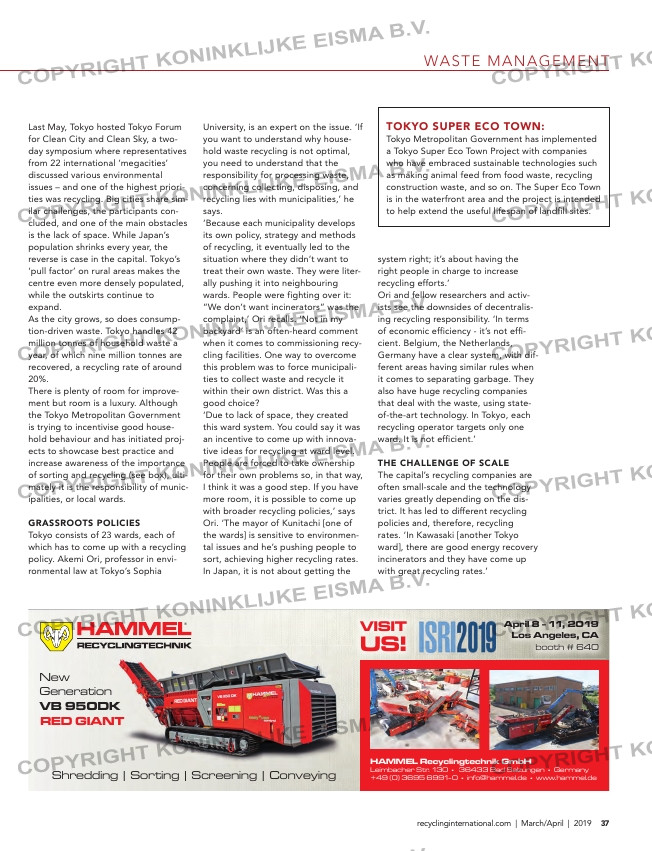Page 37 from: New issue out now!

WASTE MANAGEMENT
37recyclinginternational.com | March/April | 2019
Last May, Tokyo hosted Tokyo Forum
for Clean City and Clean Sky, a two-
day symposium where representatives
from 22 international ‘megacities’
discussed various environmental
issues – and one of the highest priori-
ties was recycling. Big cities share sim-
ilar challenges, the participants con-
cluded, and one of the main obstacles
is the lack of space. While Japan’s
population shrinks every year, the
reverse is case in the capital. Tokyo’s
‘pull factor’ on rural areas makes the
centre even more densely populated,
while the outskirts continue to
expand.
As the city grows, so does consump-
tion-driven waste. Tokyo handles 42
million tonnes of household waste a
year, of which nine million tonnes are
recovered, a recycling rate of around
20%.
There is plenty of room for improve-
ment but room is a luxury. Although
the Tokyo Metropolitan Government
is trying to incentivise good house-
hold behaviour and has initiated proj-
ects to showcase best practice and
increase awareness of the importance
of sorting and recycling (see box), ulti-
mately it is the responsibility of munic-
ipalities, or local wards.
GRASSROOTS POLICIES
Tokyo consists of 23 wards, each of
which has to come up with a recycling
policy. Akemi Ori, professor in envi-
ronmental law at Tokyo’s Sophia
University, is an expert on the issue. ‘If
you want to understand why house-
hold waste recycling is not optimal,
you need to understand that the
responsibility for processing waste,
concerning collecting, disposing, and
recycling lies with municipalities,’ he
says.
‘Because each municipality develops
its own policy, strategy and methods
of recycling, it eventually led to the
situation where they didn’t want to
treat their own waste. They were liter-
ally pushing it into neighbouring
wards. People were fighting over it:
“We don’t want incinerators” was the
complaint,’ Ori recalls. ‘Not in my
backyard’ is an often-heard comment
when it comes to commissioning recy-
cling facilities. One way to overcome
this problem was to force municipali-
ties to collect waste and recycle it
within their own district. Was this a
good choice?
‘Due to lack of space, they created
this ward system. You could say it was
an incentive to come up with innova-
tive ideas for recycling at ward level.
People are forced to take ownership
for their own problems so, in that way,
I think it was a good step. If you have
more room, it is possible to come up
with broader recycling policies,’ says
Ori. ‘The mayor of Kunitachi [one of
the wards] is sensitive to environmen-
tal issues and he’s pushing people to
sort, achieving higher recycling rates.
In Japan, it is not about getting the
system right; it’s about having the
right people in charge to increase
recycling efforts.’
Ori and fellow researchers and activ-
ists see the downsides of decentralis-
ing recycling responsibility. ‘In terms
of economic efficiency – it’s not effi-
cient. Belgium, the Netherlands,
Germany have a clear system, with dif-
ferent areas having similar rules when
it comes to separating garbage. They
also have huge recycling companies
that deal with the waste, using state-
of-the-art technology. In Tokyo, each
recycling operator targets only one
ward. It is not efficient.’
THE CHALLENGE OF SCALE
The capital’s recycling companies are
often small-scale and the technology
varies greatly depending on the dis-
trict. It has led to different recycling
policies and, therefore, recycling
rates. ‘In Kawasaki [another Tokyo
ward], there are good energy recovery
incinerators and they have come up
with great recycling rates.’
TOkyO SuPER ECO TOwN:
Tokyo Metropolitan Government has implemented
a Tokyo Super Eco Town Project with companies
who have embraced sustainable technologies such
as making animal feed from food waste, recycling
construction waste, and so on. The Super Eco Town
is in the waterfront area and the project is intended
to help extend the useful lifespan of landfill sites.
Dependable
Powerful and Efficient
with Service Worldwide
Shredding | Sorting | Screening | Conveying
April 8 – 11, 2019
Los Angeles, CA
booth # 640
HAMMEL Recyclingtechnik GmbH
Leimbacher Str. 130 · 36433 Bad Salzungen · Germany
+49 (0) 3695 6991-0 · [email protected] · www.hammel.de
®
New
Generation
VB 950DK
RED GIANT
VISIT
US!
36-37-38_tokyo.indd 37 14-03-19 08:35



